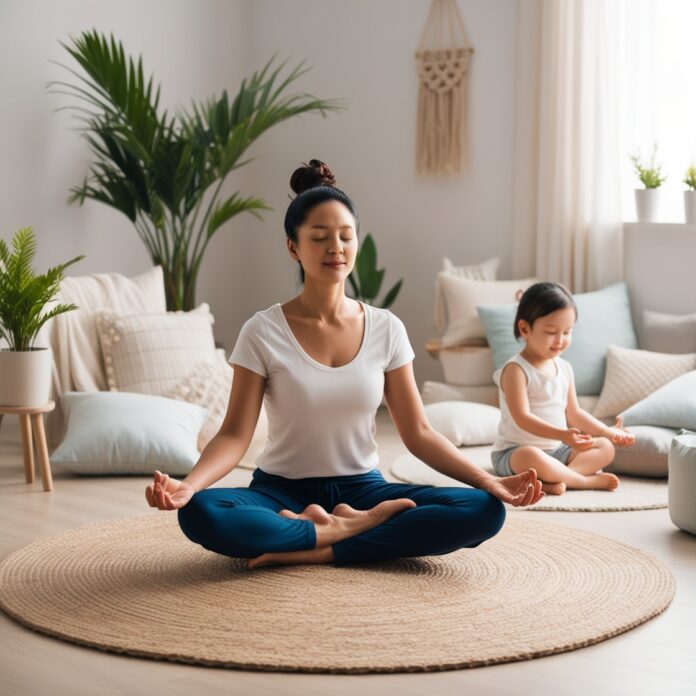Freedom of Parenthood is definitely amazing, although it usually brings headache and tiredness as well. If families are not only associated with the working place, but also with the regular babysitting involvement, very easily they can be stressed. Negatively impacting mental and physical health are the two major sides of stress, but it is good to know that there are numerous relaxation techniques made on purpose to assist the parents who are going through stress, with the management of the challenges they face in their daily life.

In this post, we’re going to uncover several of the most effective at-the-moment relaxation tips that folks can include in the way they go about their day to unwind, restore their energy, and recover their mental focus. Be it a stay-home mom or a working parent who has to juggle career and family, the hacks we are going to share are all very time-saving and life-supporting as they are geared to fit busy schedules
1. Mindful Breathing: The Power of the Breath
Mindful breathing is certainly the most simple way to remove any kind of blockade from you. Provided you are breathing mindfully you are able to remove the stress almost immediately and relax. It really helps because it is not a time-consuming process and nothing is difficult here. A practice like simply sitting for a few minutes each day and being present in the moment can give immediate results by lessening anxiety and increasing mental strength.

How to practice mindful breathing:
- Sit in some quiet place, where you can sit comfortably, and close your eyes.
- Breathe in slowly through your nose for four counts, hold it for four counts, and then breathe out slowly through your mouth for six counts.
- Do this procedure for 5 to 10 minutes, focusing only on your breath.
Why it works: The main reason is that, when we pay attention to the breath, the parasympathetic nervous system is activated which, in turn, lowers the heart rate and relaxes the body.
2. Progressive Muscle Relaxation (PMR)
Progressive Muscle Relaxation is a very simple technique. It first makes your different muscle groups tense and then relaxes the tension. This approach is most suitable for those parents who face a situation when their bodies get tense due to some stress, which then can lower down. PMR is a mainstay in self-help literature and can help in finding the areas that are tight and then releasing them to reduce both mental and physical stress.

The way you should do PMR is:
- First, find a quiet and comfortable place to sit or lie down.
- You should start with your toes and continue with your head, working the muscles of a group for 5-10 seconds, then stop doing this for 20-30 seconds.
- Recognize the feeling of each muscle group as it is unlocked.
- Theologies like PsychologyTM show PMR’s beneficial effect in the very process of breaking down stress physically through the focus and tension release on every muscle part, a demystified and hence relaxable state can thus be achieved, which can be very beneficial to those parents (fathers and mothers equally) that are always busy taking and lifting (of their children).
The redaction system has added the following: The benefit provided by PMR is the dissolution of the physical stress and tension due to the fact that the busy parent who is tied up with taking care of and lifting his/her children will benefit the most out of the removal of stress and tension)
3. Creative Outlets: Engaging in Hobbies
Using their imagination when practicing a hobby can be a great way to relax and decrease stress levels. Unfortunately, most parents are caught up in buying what their children want and leave hobbies they love behind. However, the re-kindling of an old hobby—be it painting, writing, gardening, or playing an instrument—can be a powerful tool for stress reduction along with the accomplishment of personal back.

The way of including your artistic hobbies into a regular routine is:
- Make time for your hobby at some point during the day, 15-30 minutes are recommended, several times a week.
- Should you find that you are pressed for time, then go for smaller, more practical tasks that can be finished in your available time.
- If it’s possible involve your kids in your hobby so that it turns into a family thing.
Why it works: Doing something creative makes you lose track of time and feel like time is standing still, thus helping you stay calm and refreshed. Fun things to do while learning a new hobby leave adults feeling full of energy and elation not depending at all on being parents.
4. Meditation: A Few Minutes of Quiet
Meditation is a widespread practice that has been known to have a calming effect, help boost the immune system, and improve the quality of life for people. There might be no time to be seated for the parents, but there is an alternative – to do it gradually. Even just meditating for 5-10 minutes will impact the way you tackle your day with stress a lot.

How to meditate:
- Simple and restful, sit on the floor, with your back against the wall in a chair that is at least high enough for you to touch the ground with your feet.
- Shut your eyes and do your breathing or mantra (silently and internally repeating a word or short phrase) as your object of concentration.
- If your head starts to drift away, kindly ask your mind to return to your breath or your mantra.
How it works: Meditation is designed to reduce the worries of the mind, put an end to the chatter that makes up stress, and create a deep relaxation and inner peace.
5. Physical Activity: Moving Your Body
It’s well known that sport is the best way to ease the tension and boost your mood. Physical activities elicit endorphins, the body’s natural mood boosters the release of which instantly make us happier. Parents, even by doing a little activity, can relieve everyday stress which is both physical and mental.

How to get started:
- Set a goal for yourself of 30 minutes of steady physical activity 3-5 times a week.
- If carving out gym time is impossible, then please try some home exercises or activities such as walking, jogging, or maybe yoga.
- Get your kids involved in some outdoor physical activities, such as taking a walk in the park, cycling, or do some dance moves at home.
Why it works: Exercise is helpful in relieving stress, apart from managing energy levels and your various wellness, as well as mental health, it is very important for parents.
6. Setting Boundaries and Saying No
One of the things that stress parents the most is the wish to agree with everything. A range of situations such as participating in school events, meeting with people, or doing additional work tasks will always be the case if one constantly stretches oneself too much. The skill of setting boundaries and saying no is a great one to reduce stress, while at the same time it is the best way to stay healthy.
How to use this skill:
- Go through the commitments you’ve made and try to see if you are committing more than you are expected.
- Turn down those requests which do not match your priorities or values.
- One thing to remember is that saying no is a sign of self-care, rather than selfishness.
Why it works: Coming up with boundaries will go a long way in assisting you to put yourself first, and as a result, reduce the probability of stress. This directly involves the persons you depend on both within your family and the community.
7. Sleep Hygiene: Prioritizing Rest
While focusing on relaxation and happiness, one of the crucial things is sleep, but unfortunately, a large number of parents are not getting enough real sleep. Poor sleep practices can lead to development of stress, mood swing, and tiredness, and making changes in one’s sleep is the place to start for a quick solution thus you can restart your day with no pressure and more energy.
Steps to improve sleep hygiene:
- Stick to a consistent bedtime schedule even on weekdays.
- You can make the room peaceful by shielding it from noise, light, and electronic devices.
- Avoid or cut down on caffeine and alcohol intake during the evening time, particularly before going to bed.
What it does: Healthy sleep hygiene regulates your sleep patterns to facilitate a deep sleep that has a very positive effect on your mood, energy, and overall resistance against stress.
Bringing up children is among the most satisfying yet challenging jobs a person can have, and it’s critical to know that self-care is not self-indulgent – it’s self-preserving. By including these methods of relaxation as part of your everyday activities, you can not only lower your stress level but also have positive health impacts on your body and brain, which in the long run, will be your family’s gain as well.



